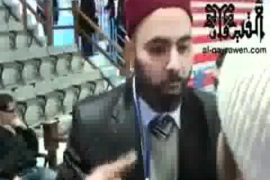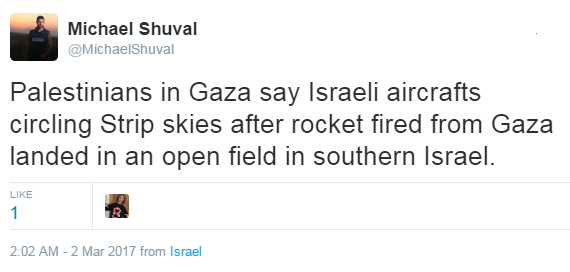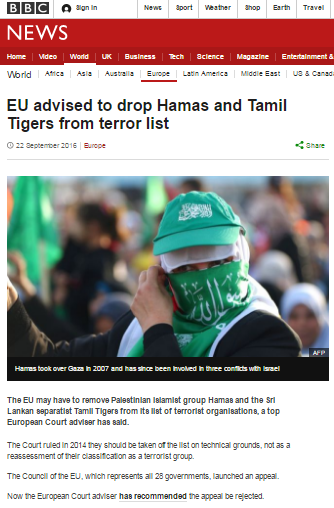As we saw in part one of this post, the first five minutes of an item relating to the weekend’s events in southern Israel and the Gaza Strip that was aired in the July 16th edition of the BBC Radio 4 ‘Today‘ programme was given over to an unchallenged polemic from UNRWA spokesman Chris Gunness.
Up until this point in the item listeners had not been told that some 200 projectiles had been launched by terror factions in the Gaza Strip at Israeli communities over the weekend. They had not heard an accurate description of the building – a Hamas training facility – in which the two teenagers had been located when they were accidentally killed. Neither had they been informed that this latest round of violence began when an IDF officer was wounded in a grenade attack at the border on July 13th. They had however heard a severely whitewashed account of terror attacks perpetrated along the border fence between Israel and the Gaza Strip during the past three and a half months.
Presenter John Humphrys next brought in the BBC Jerusalem Bureau’s Tom Bateman (from 01:39:29 here). [emphasis in italics in the original, emphasis in bold added]
Humphrys: “Chris Gunness; thank you very much for that and let’s turn to, as I say, Tom Bateman our correspondent. Tom, I was trying to suggest to Mr Gunness what the Israelis would say. What are they in fact saying this morning, if anything?”
Bateman: “Well, you know, it was a significant flare-up over the weekend and I think, you know, eh..on a similar scale we saw a couple of months ago.”
In fact, 25% fewer attacks took place on May 29-30 than on July 13-14. Bateman than went on to tell listeners that Israel had been “bombing the Gaza Strip” rather than carefully selected terrorist infrastructure as is actually the case.
Bateman: “Whereby, you know, you had Israel bombing the Gaza Strip – it said more than 40 militant sites – and at the same time the Israelis say up to 200 rockets and mortars fired from Gaza. Now one of those rockets hit a house in the town of Sderot: people were wounded.”
While Bateman did inform listeners of the scale of attacks launched from the Gaza Strip, he failed to clarify who fired the missiles and presented the numbers with unnecessary ‘Israel says’ qualification. As was the case in BBC World Service news bulletins, while listeners had heard plenty about two teenagers – or “children” – killed in Gaza, they were not told that the wounded in Sderot also included people in that age group. Bateman continued:
Bateman: “So the Israeli perspective is very much about that point of provocation. They’ve said – the Israeli Defence Forces said over the weekend that it is increasing the number of Iron Dome anti-missile systems in central and southern Israel. But I think, you know, the real decision maker here is the Israeli security cabinet and there are even more hawkish elements in the right-wing coalition to Benjamin Netanyahu that have been saying that – for example – the ceasefire was allowing Hamas to dictate the conditions. Naftali Bennett, a member of the security cabinet, was Tweeting over the weekend in effect suggesting that this was Israel caving into Hamas who was dictating the terms to this Egyptian mediation.”
As documented here previously, BBC coverage of the three months of Palestinian arson attacks that have destroyed some 7,400 acres of farmland, woodland and nature reserves and caused millions of dollars-worth of damage has been very poor indeed. It is therefore highly unlikely that listeners would be able to fill in the gaps for themselves as they heard Bateman’s tepid description of that terrorism, together with his introduction of the theme of “asymmetric warfare”.
Bateman: “But I think the tensions are going to continue to simmer, John, because what Israel has now been concerned about is this…what’s been happening on a near daily basis, which has been Palestinians at the fence flying kites and filling condoms with helium and sending them over the fence with flammable objects tied to them and burning fields. And you now have this sort of spectre that I think will be seen from the outside – and this is tension on Mr Netanyahu – as a sort of asymmetric warfare because the Israelis were using airstrikes against people over the weekend who were sending these kites over the fence.”
While failing to clarify that Egypt and Israel enforce closures of their borders with the Gaza Strip precisely because of Hamas terrorism, Bateman closed with a reference to an incident on July 13th but refrained from informing listeners that the “15 year-old boy” was climbing the border fence when shot.
Bateman: “The Palestinians say that this is simply protest against the blockade that continues by Israel and by Egypt. It is made worse by the internationally recognised Palestinian Authority imposing sanctions on Hamas in Gaza – on some of the public sector payments. But, you know, those tensions at the border are going to continue. There was a 15 year-old boy shot dead by the Israelis again at the fence on Friday and I think, you know, that issue over how Israel responds to what’s happening at the fence will increase the political pressure on Mr Netanyahu.”
Later on in the same edition of ‘Today’ listeners heard another item (from 02:50:20 here) relating to the same topic which was introduced by presenter Justin Webb as follows:
Webb: “We heard earlier in the programme about the worst exchange of hostilities between Gaza [sic] and…err…Israel since the war in 2014. There is now a fragile ceasefire but Chris Gunness, the spokesman for UNRWA the United Nations relief agency that operates in Gaza, said he condemned what had happened.”
Radio 4 listeners then heard part of Gunness’ previously aired unchallenged polemic recycled:
Gunness: “These deaths illustrate tragically the dangers of using overwhelming air strikes in a heavily populated area. Imagine a foreign army using massive air power on a building in central London and two British children are killed and ten wounded. That would rightly…there would rightly be international outrage. Imagine if that attack by a foreign army had already killed 146 people since the end of March of which 21 have been children. Imagine if 15,000 Brits had been wounded by that foreign army of which over 8,000 had been hospitalised, over 4,000 of them wounded by live fire. That’s what’s happened in Gaza since the end of March: make no mistake. And there rightly should be international outrage and condemnation.”
Now a quarter of the way into the four-minute item, Webb introduced former IDF spokesman Peter Lerner, whom he proceeded to interrupt repeatedly.
After Lerner had clarified the number of missiles fired from Gaza on July 14th, the number of acres of land in Israel destroyed by Palestinian arson attacks and the fact that Iran had funded the ‘Great Return March’ to the tune of $45 million which could have been used to improve Gaza’s infrastructure, Webb interrupted him with the false suggestion that the two teenagers accidentally killed because they were in a building that listeners had still not been told was a Hamas training facility were deliberately targeted.
Webb: “But the point Chris Gunness was making was that even if you accept all of that, attacking a place where there are children, killing two children, is not a proper proportionate response.”
When Lerner pointed out that Hamas “basically wrote the book on the use of human shields”, Webb interrupted him again.
Webb: “But even if that is the case, is it right to kill the shields?”
When Lerner raised the topic of Hamas’ accountability for the events, Webb interrupted once more.
Webb: “Well what about an investigation then that looks at both sides?”
As we see listeners to BBC Radio 4’s ‘Today’ programme on July 16th heard a total of eleven minutes and forty seconds of content relating to a story based around the deaths of two teenagers. However, not once in all that time were they told that the building in which the two were located was a Hamas training facility with access to the terror group’s underground tunnel network. Rather, even at the end of both items, listeners were still under the mistaken impression that this was just some random “building in a popular gathering place in Gaza City, a park where many families go” as Chris Gunness falsely claimed and – significantly – as Hamas tried to spin the story.
So much for the BBC’s supposed obligation to provide its funding public with “accurate and impartial news, current affairs and factual programming of the highest editorial standards so that all audiences can engage fully with issues across the UK and the world”.
Related Articles:
UNRWA spokesman’s biased polemic goes unchallenged on BBC R4 ‘Today’ – part one
Gaza missile attacks get 44 words on the BBC News website
An overview of BBC WS July 14 news bulletins




